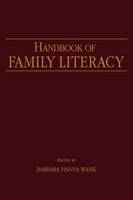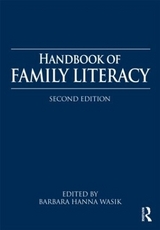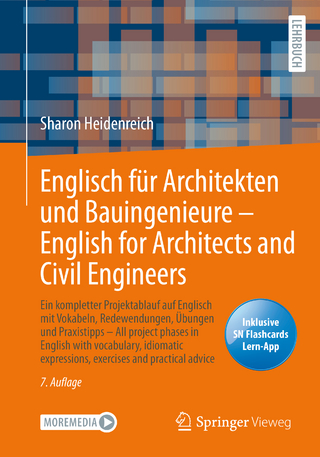
Handbook of Family Literacy
Lawrence Erlbaum Associates Inc (Verlag)
978-0-8058-5240-0 (ISBN)
- Titel erscheint in neuer Auflage
- Artikel merken
The emerging field of family literacy, which cuts across early childhood education, early literacy development, parent education, adult education, and parent-child literacy interactions, has never had a comprehensive volume that pulls together and integrates its many interacting components. That is the mission of this handbook. It provides scholars, students, policymakers, and practitioners (both inside and outside the field) with an invaluable snapshot of its current boundaries and rapidly growing content. With contributions from experts in each of its component fields, it provides an up-to-date picture of existing family literacy programs, of the research and theories that guide these programs, of current issues, and of likely future directions. Key features of this outstanding new book include the following:
*Comprehensive--Whereas many books deal with various components of this broad and loosely coupled field, until now there has never been a book that profiles and integrates its overlapping component fields.
*Recommendations for Practice--Information essential to the development of curriculum and instructional strategies is integrated throughout the book. Practical guidance is offered in such diverse and intersecting areas as early literacy, the role of literature and storybook reading in literacy learning, adult learning needs and strategies, and professional development.
*Cultural and Family Influences--The book examines cultural and family influences on literacy practices and provides effective ways of responding to family diversity, including the needs of bilingual and immigrant participants.
*Program Implementation--Program recommendations cover such distinct topics as integrating the curriculum, enriching early childhood classrooms, enhancing parent-child literacy interactions, and coordinating with other agencies.
*Assessment--To promote future research and evaluation, attention has been focused on ways of assessing children, adults, the educational setting, and implementation strategies.
This book is intended for professionals (directors and staff) and graduate students in the areas of family literacy, early childhood education, child development, parenting, and adult education, as well as researchers and policymakers in child development and family literacy.
Contents: Preface. Part I: Overview of Family Literacy: Development, Concepts, and Practice. B.H. Wasik, S. Herrmann, Family Literacy: History, Concepts, Services. P. Hannon, V. Bird, Family Literacy in England: Theory, Practice, Research, and Policy. Part II: Children and Early Childhood Education Within Family Literacy Programs. J. Sparling, Earliest Literacy: From Birth to Age 3. C.J. Lonigan, Emergent Literacy Skills and Family Literacy. L.M. Morrow, J. Temlock-Fields, Use of Literature in the Home and at School. V. Purcell-Gates, Family Literacy as the Site for Emerging Knowledge of Written Language. A.S. Fuligni, J. Brooks-Gunn, Early Childhood Intervention in Family Literacy Programs. D.K. Dickinson, R.G. St.Pierre, J. Pettengill, High-Quality Classrooms: A Key Ingredient to Family Literacy Programs' Support for Children's Literacy. Part III: Parenting and Parent Education. D.R. Powell, Parenting Education in Family Literacy Programs. R.C. Pianta, Relationships Among Children and Adults and Family Literacy. K. Jacobs, Parent and Child Together Time. F.V. Rodríguez-Brown, Project FLAME: A Parent Support Family Literacy Model. Part IV: Adult Education. J.P. Comings, The Process and Content of Adult Education in Family Literacy Programs. J.A. Alamprese, Understanding Adult Education in the Context of Family Literacy. E.N. Askov, Workforce Literacy and Technology in Family Literacy Programs. Part V: The Home Environment and Home Services. K.A. Roskos, S. Twardosz, Resources, Family Literacy, and Children Learning to Read. C.S. Hammer, A.W. Miccio, Home Literacy Experiences of Latino Families. D. Bryant, B.H. Wasik, Home Visiting and Family Literacy Programs. Part VI: Coordination and Integration Issues in Family Literacy. M. Potts, Integration of Components in Family Literacy Services. G.L. Harbin, S. Herrmann, B.H. Wasik, D.R. Dobbins, W.K. Lam, Integrating Services for Family Literacy. Part VII: Diversity and Culture. V.L. Gadsden, Family Literacy and Culture. L. Vernon-Feagans, D. Head-Reeves, K. Kainz, An Ecocultural Perspective on Early Literacy: Avoiding the Perils of School for NonMainstream Children. H.S. Wrigley, We Are the World: Serving Language-Minority Adults in Family Literacy Programs. J. Strucker, C. Snow, B.A. Pan, Family Literacy for ESOL Families: Challenges and Design Principles. S. Emberton, Family and Child Education (FACE): Family Literacy Services for American Indians. Part VIII: Assessment and Evaluation. P. Johnston, E. Yanoff, Early Childhood Assessment and Family Literacy. C.J. Lonigan, K.D. McDowell, B.M. Phillips, Standardized Assessments of Children's Emergent Literacy Skills. D. Powell, L. Okagaki, K. Bojczyk, Evaluating Parent Participation and Outcomes in Family Literacy Programs: Cultural Diversity Considerations. B. Van Horn, L. Forlizzi, Assessment of Adult Literacy Skills. R.G. St.Pierre, A.E. Ricciuti, F. Tao, Continuous Improvement in Family Literacy Programs. Part IX: What the Future May Bring. S. Darling, Future Directions for Family Literacy. B.H. Wasik, Family Literacy Programs: Synthesizing Across Themes, Theories, and Recommendations.
| Erscheint lt. Verlag | 5.4.2004 |
|---|---|
| Verlagsort | Mahwah |
| Sprache | englisch |
| Maße | 152 x 229 mm |
| Gewicht | 1066 g |
| Themenwelt | Geisteswissenschaften ► Sprach- / Literaturwissenschaft ► Sprachwissenschaft |
| ISBN-10 | 0-8058-5240-9 / 0805852409 |
| ISBN-13 | 978-0-8058-5240-0 / 9780805852400 |
| Zustand | Neuware |
| Haben Sie eine Frage zum Produkt? |
aus dem Bereich



